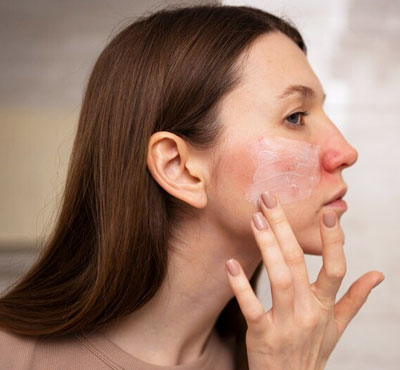What Is Rosacea?
Rosacea is a chronic inflammatory disease that typically affects the forehead, the middle of the face, which is the area around the cheeks, the nose and the chin, which may also extend to the forehead. Being more prone to blushing or flushing than other people may represent the initial sign, but persistent flushing and other symptoms might become a lifetime tendency.
People of all colours can get Rosacea, although those with fair skin, primarily those from Northern Europe, are more likely to suffer from it. Although the exact cause of Rosacea is unknown, it is believed to be the result of an intricate relationship between immunological, environmental, and hereditary factors.
Types of Rosacea
Rosacea can take on many forms, and dermatologists categorize it into a collection of four main subtypes:-
Erythematotelangiectatic Rosacea (ETR)
- Characterized by persistent redness and visible blood vessels.
- The skin may be sensitive and feel prone to burning or stinging.
Papulopustular Rosacea
- Features acne-like breakouts along with redness.
- Commonly misidentified as adult acne.
Phymatous Rosacea
- Causes thickened skin with a marred surface texture, which may be present on the nose (a condition called rhinophyma).
- More common in men.
Ocular Rosacea
- Contributes to the redness, irritation and light sensitivity of the eyes.
- If untreated, may cause complications such as Blepharitis or eye vision issues.
Symptoms of Rosacea
The symptoms of Rosacea vary widely but commonly include:-
- Persistent facial redness or flushing.
- Visible blood vessels (Telangiectasia).
- Acne-like bumps or pustules.
- Thickened skin, particularly on the nose.
- Burning or stinging sensations.
- Eye irritation, dryness, or watery eyes.
Causes & Triggers of Rosacea
Causes
The exact cause of Rosacea is not fully understood, but contributing factors include:-
- Genetics - A family history of Rosacea has been suggested as a risk factor.
- Immune Response - Activation of the immune system could lead to inflammation.
- Demodex Mites - A heavy infestation of these commensal microscopic mites on the surface of the skin could play a role.
- Environmental Factors - Sunlight, wind, and high temperatures can make symptoms worse.
Triggers
Certain triggers can exacerbate Rosacea flare-ups, including:-
- Hot or spicy foods and beverages.
- Alcohol consumption.
- Stress or emotional distress.
- Harsh skincare products.
- Intense physical activity.


